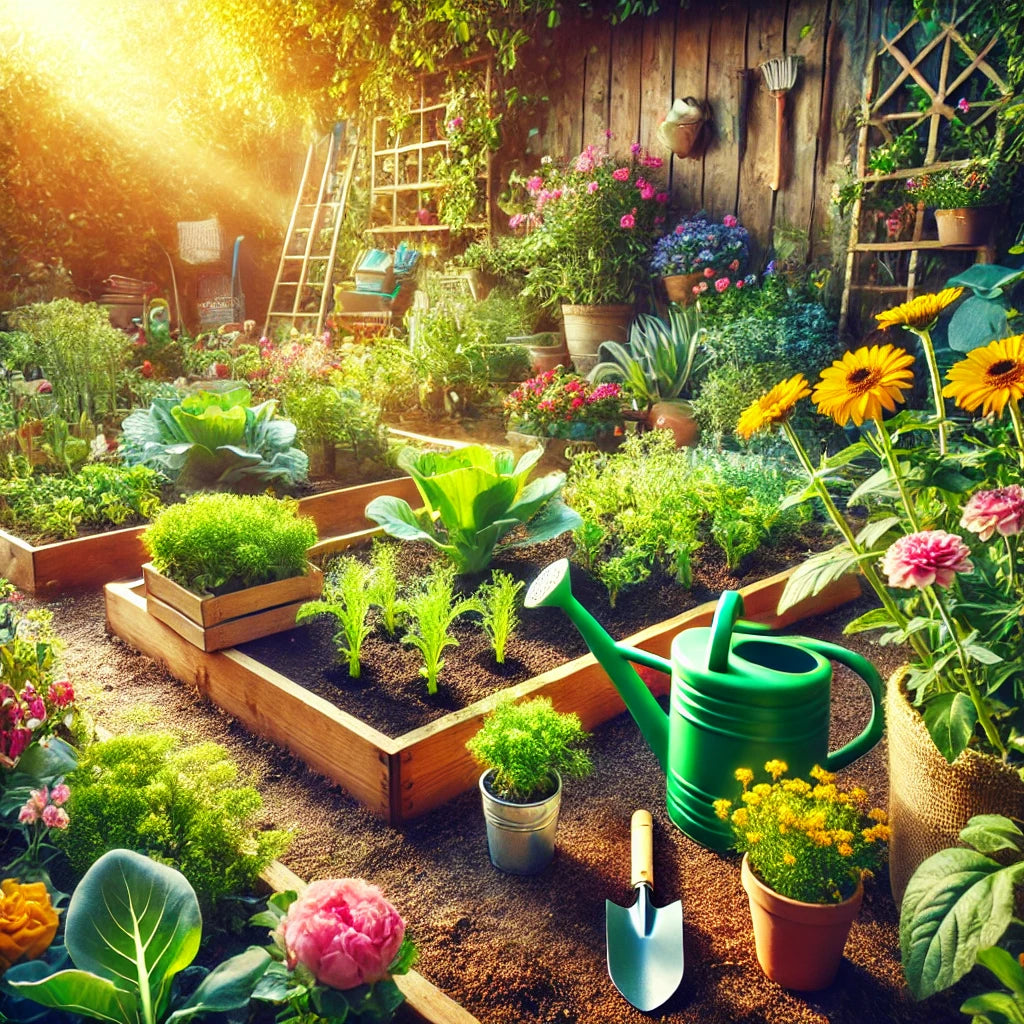10 Easy Gardening Tips for Beginners to Grow a Thriving Garden

Gardening is a rewarding activity that brings beauty, tranquility, and even fresh produce into your life. For beginners, however, starting a garden may feel daunting. Fortunately, with a few simple steps and the right guidance, anyone can grow a flourishing garden. In this guide, we’ll share 10 easy gardening tips that will help beginners nurture a healthy, thriving garden with minimal experience.
1. Start with the Right Plants
Choosing the right plants is the first step in successful gardening. For beginners, it’s best to select plants that are easy to care for and suited to your climate. Some beginner-friendly plants include herbs (like basil and mint), leafy greens, and marigolds. These are hardy and forgiving, making them ideal for beginners.
Tip: Research which plants grow well in your region and begin with low-maintenance varieties.
Recommended Product: Burpee Herb Seed Starter Kit – This kit contains easy-to-grow herbs and is perfect for beginners looking to start with something manageable.
2. Understand Your Soil
Soil quality plays a crucial role in the health of your plants. Different plants thrive in different soil types, so it’s essential to know what you’re working with. You can use a soil tester to check pH and nutrient levels, helping you choose the right plants or amend the soil as needed.
Tip: Aim for a slightly acidic to neutral pH for most plants, around 6.0 to 7.0, and consider adding compost to enrich the soil.
Recommended Product: Sonkir Soil pH Meter – This easy-to-use soil tester provides instant readings on pH, moisture, and light levels, helping beginners understand their soil conditions.
3. Ensure Proper Sunlight
Sunlight is essential for photosynthesis, and most plants need 6-8 hours of sun each day. Observe your garden area to identify sunny spots and plant sun-loving species there. For shaded areas, choose plants that can thrive with less light, such as ferns and hostas.
Tip: Place plants according to their sunlight needs, with sun-loving plants in the brightest spots and shade-loving ones in more protected areas.
4. Water Wisely
Proper watering is key to preventing both under-watering and over-watering, which can damage plants. It’s best to water deeply but less frequently to encourage deep root growth. A good rule of thumb is to water early in the morning to minimize evaporation.
Tip: Use a watering can or hose with a gentle spray to avoid displacing soil and damaging delicate plants.
Recommended Product: Qilebi Long Spout Watering Can – This watering can is easy to handle, allowing precise control over watering to reach the roots without overwhelming young plants.
5. Use Organic Fertilizers
Organic fertilizers enhance soil fertility without the use of harsh chemicals, making them a great choice for home gardens. Compost, bone meal, and fish emulsion are excellent organic options that provide a balanced nutrient mix.
Tip: Apply fertilizer according to package instructions, as too much can harm plants. Generally, once a month during the growing season is effective.
Recommended Product: Jobe's Organics All-Purpose Fertilizer Spikes – These easy-to-use fertilizer spikes release nutrients slowly, providing a balanced feeding that promotes healthy plant growth.
6. Plant for the Seasons
Planting according to the seasons allows you to enjoy a garden that changes and grows year-round. For example, plant cool-season vegetables like lettuce and spinach in early spring and fall, while warm-season plants like tomatoes and peppers thrive in summer.
Tip: Research seasonal planting in your area to ensure you’re planting at the optimal time for each species.
Related Article: Guide to Seasonal Planting for more detailed tips on planting for each season.
7. Manage Weeds Regularly
Weeds compete with your plants for nutrients, water, and sunlight, so it’s essential to control them. Regularly checking and removing weeds by hand or using a small hoe can prevent them from taking over your garden.
Tip: Add a layer of mulch around plants to suppress weeds and retain moisture. Organic mulches, like straw or wood chips, work well.
Recommended Product: Fiskars Hand Weeder – This tool makes it easy to remove weeds from tight spaces without disturbing your plants.
8. Add Mulch for Moisture Retention
Mulching is a great way to retain moisture, regulate soil temperature, and reduce weed growth. Spread a 2-3 inch layer of mulch around your plants, avoiding the stems, to promote healthy, hydrated roots.
Tip: Organic mulch, such as wood chips or shredded leaves, not only improves water retention but also breaks down over time, adding nutrients to the soil.
Recommended Product: EZ-Straw Seeding Mulch – This biodegradable mulch is easy to apply and effective in retaining moisture and suppressing weeds.
9. Prune for Healthier Plants
Regular pruning encourages healthier growth, prevents disease, and improves airflow around your plants. Remove dead or damaged branches, and trim back overgrown areas to encourage new growth and maintain shape.
Tip: Use clean, sharp pruning shears to prevent damage and disease transmission between plants.
Recommended Product: Corona BP 3180D Classic Bypass Pruner – These durable pruners are ideal for precision cuts, making pruning easy and efficient for beginners.
10. Enjoy the Process and Be Patient
Gardening is as much about the journey as it is about the results. Plants take time to grow, and every garden will face challenges like pests or unexpected weather. Embrace the process, learn from any setbacks, and celebrate your garden’s progress.
Tip: Spend a little time in your garden each day, even if it’s just to observe. Consistent attention allows you to catch issues early and appreciate small improvements.
Related Article: Gardening for Beginners: How to Start a Garden for more insights on getting started with gardening.
Conclusion: Start Growing Your Thriving Garden
Gardening may seem intimidating at first, but with these 10 easy tips, beginners can cultivate a beautiful and productive garden with confidence. Start by choosing the right plants, understanding soil and sunlight needs, and maintaining regular watering, fertilizing, and weeding. As you watch your garden flourish, you’ll find immense satisfaction in the process. Remember, gardening is a journey—enjoy each step along the way!
Ready to grow your gardening skills? Explore more gardening resources and tips on our site and take your garden to the next level!
